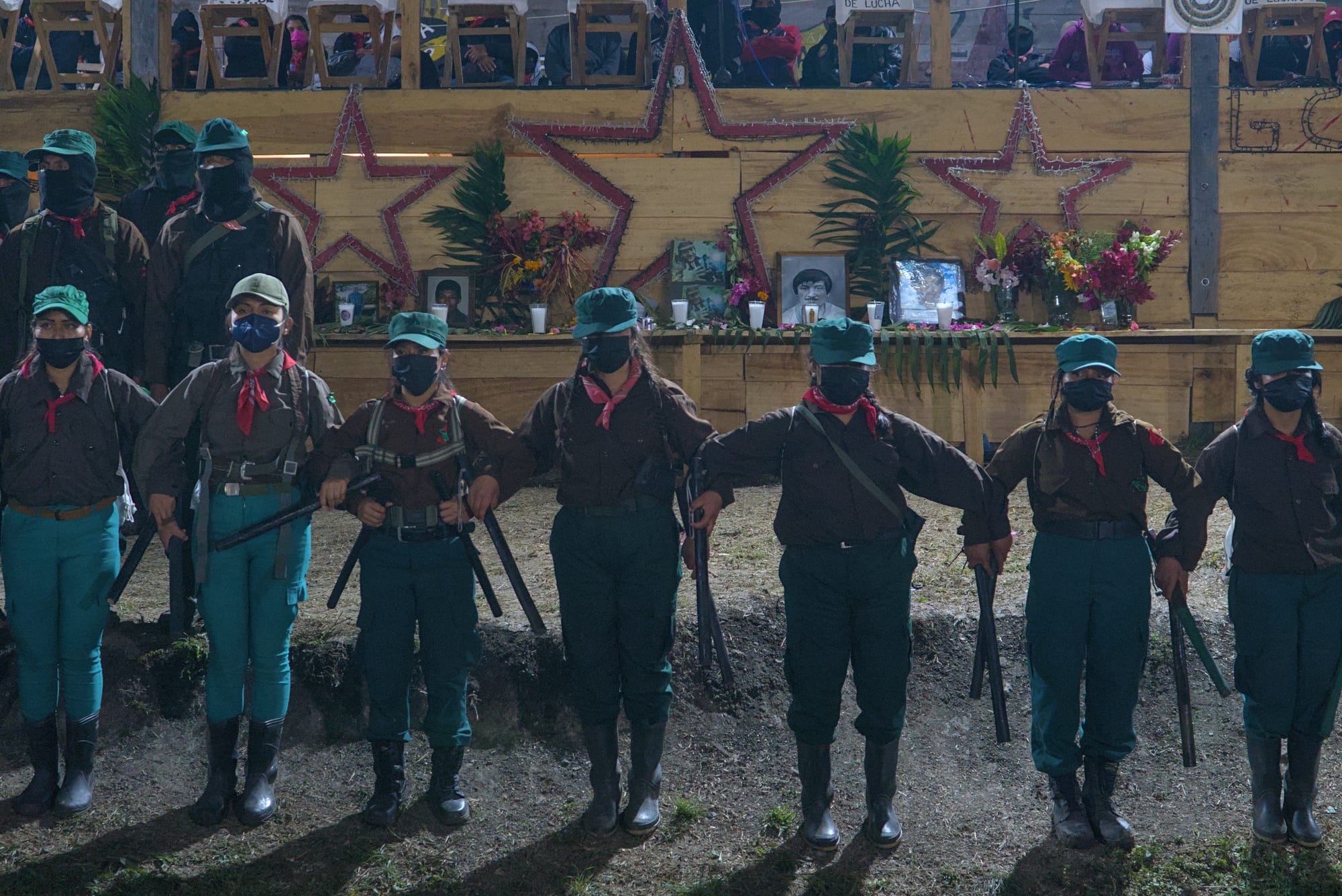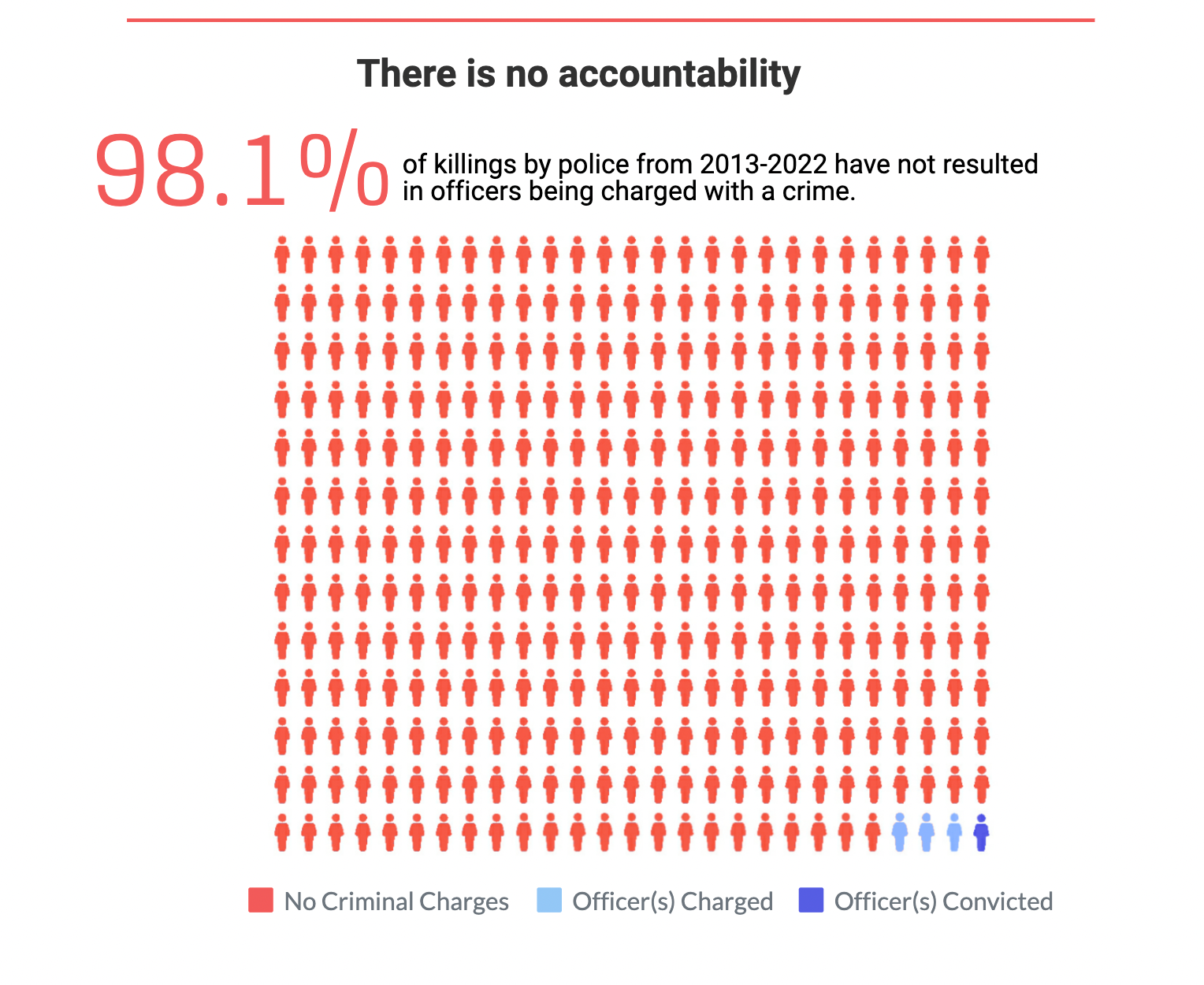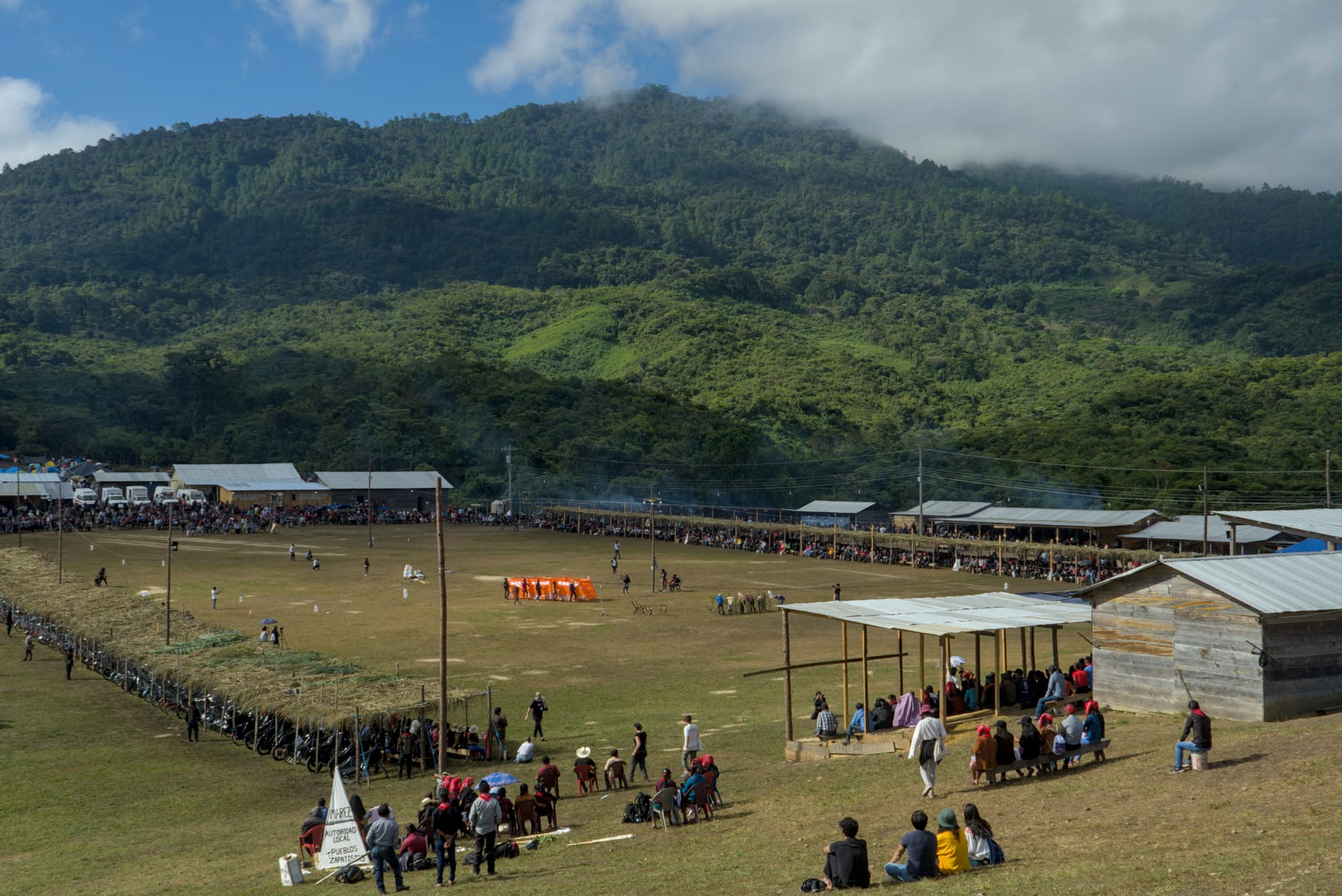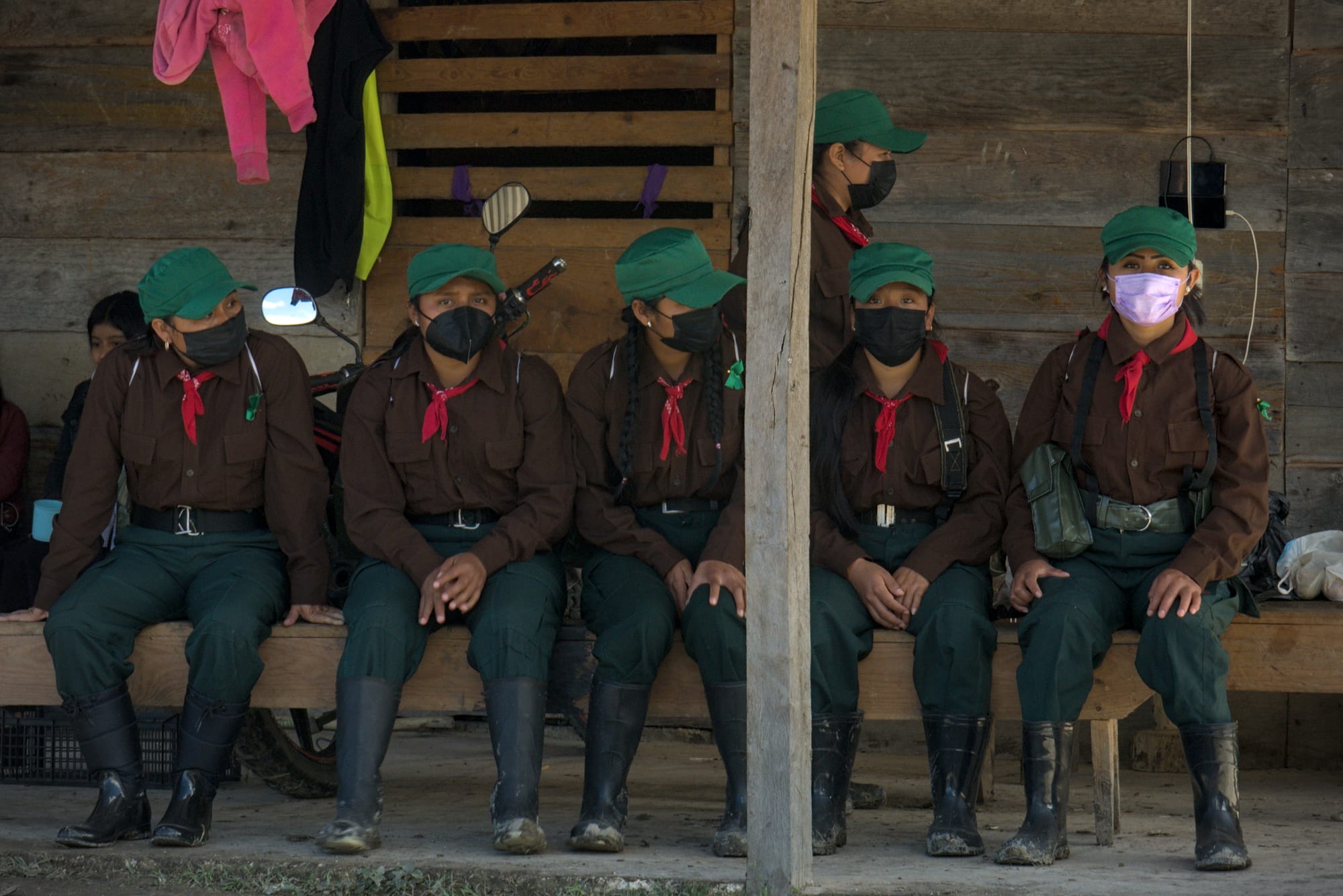The people command and the government obeys
In the world we want, everyone fits. In the world we want, many worlds fit

Our feature today is a report from Chiapas, Mexico for an event marking the 30th anniversary of the Zapatista uprising by Rowan Glass.
Glass later reported for Hell World on the 12th anniversary of the Rojava Revolution in northeast Syria.
First some other news.
At least 1,232 people were killed by police in the U.S. in 2023 according to the research group Mapping Police Violence. That is an increase of 30 from 2022 and represents the highest number of killings in a decade. It breaks down to roughly three people killed by police per day. In fact there were only twenty days in the entire year in which someone wasn't killed by police.
"Black people were 26% of those killed by police in 2022 despite being only 13% of the population," they note.
Only 1 in 3 of those killings were set into motion by police reporting to a violent crime they found. The vast majority resulted from non-violent crimes or traffic stops and mental health checks.
A third of the killings were while the person was trying to flee.
Here's another stat they reported you might not find surprising:

Elsewhere a "majority of debtors to US hospitals are now people with health insurance" the Guardian reports.
In Texas Rep. Henry Cuellar and others are saying Texas National Guard prevented federal Border Patrol agents from assisting a woman and two children who drowned in the Rio Grande.
A woman and two children drowned in the Rio Grande on Friday while trying to enter the U.S. near a section of the southern border where Texas National Guard soldiers have prevented federal Border Patrol agents from processing and rescuing migrants.https://t.co/jCuNy52jHo
— Evan Hill (@evanhill) January 14, 2024
CBS News:
On Friday night, Border Patrol identified six migrants in the Rio Grande who were in distress near the park, known as Shelby Park, Democratic Congressman Henry Cuellar said in a statement Saturday. Federal agents, Cuellar added, unsuccessfully attempted to contact Texas state officials about the emergency by phone. Then, when Border Patrol agents went to the park and asked to be allowed to render aid to the migrants, they were denied entry, according to Cuellar.
"Texas Military Department soldiers stated they would not grant access to the migrants — even in the event of an emergency — and that they would send a soldier to investigate the situation," Cuellar said, noting that Mexican officials recovered three bodies on Saturday.
On Friday Texas governor Greg Abbott attempted to clarify recent comments he made about the state doing everything they can to stop migrants besides shooting them.
“The only thing we are not doing is we’re not shooting people who come across the border, because, of course, the Biden administration would charge us with murder,” Abbott said.
In Iowa Donald Trump told supporters that they had to get out to caucus for him today despite inclement weather. Even if "you're sick as a dog" he said. "If you vote and then pass away it's worth it," he said.
And in the only democracy in the Middle East a teacher in Jerusalem is speaking out against his arrest for expressing concern for the ongoing slaughter of civilians in Gaza.
"Police seized his phone and two laptops before interrogating him on suspicion of committing an act of treason and intending to disrupt public order," Democracy Now reported.
"After being in jail for four days, Baruchin was freed but lost his job as a teacher and is still facing charges. 'These days Israeli citizens who are showing the slightest sentiment for the people of Gaza, opposing killing of innocent civilians, they are being politically persecuted, they go through public shaming, they lose their jobs, they are being put in jail,' says Baruchin, who says if he had been Palestinian, he would have faced more violence."
Then there's this:
BREAKING: SCOTUS will hear Johnson v Grants Pass, a case about if homeless people can be punished for using things like pillow and blankets when sleeping outside if there are no safe shelters.
— Jesse Rabinowitz 🔥🌹@jesserbnwtz.bsky.social (@jesserbnwtz) January 12, 2024
This is the biggest SCOTUS case about homelessness in decades.
Read more on the case here.
The only thing both Democrats and Republicans are in full agreement about right now is begging the Supreme Court to let them toss the belongings of the unhoused without due process when shelter isn't available. Even "progressive" Gavin Newsom.https://t.co/5KeHg7Swhb
— Housing 4 All is Hot (@ahouse4all) January 12, 2024
I don't know maybe they'll rule on the side of decency and human compassion this time? Anything is possible I suppose. One has to think such things.
Aside from all of that The Curse finale was really good. And the Detroit Lions won a playoff game. So at least we have that.
Did you miss this Hell World from the other day about the music of the late great Jason Molina? Man it was a good one. Please give it a read and check out his music if you never have.

I wrote in part:
But choosing from Jason Molina’s oeuvre (sorry I used the word oeuvre) is especially hard for me. Not only because he was extraordinarily prolific for a man who didn’t darken a single day on the tumbling side of forty but also because compared to Elliott Smith and R.E.M and so on he is a relatively recent obsession of mine. Yes I was floored by the Magnolia Electric Co. the record when it came out like every other young and sad and would-be literary person who heard it but for a long time I had set his music aside as a sort of sub-basement of sadness that I didn’t want to go wandering down into.
Afraid the flashlight might go out if you understand me.
Or maybe I thought of it like an emergency ax in the glass thing on the wall in case of a fire.
One of those hammers you keep in your glove box in case your car goes into the river.
So I didn’t fully dig into him until four or five years ago. Not until I became an actual alcoholic I guess. The timing on that lines up pretty good.
Ok here's Rowan Glass reporting from Chiapas. I'd appreciate your support to help pay for work like this if you can. Thanks as always for reading.

Mexico’s Zapatistas just celebrated 30 years of autonomy. What comes next?
by Rowan Glass
I recently attended the 30th anniversary of the Zapatista uprising in Chiapas, Mexico. Here, Indigenous rebels have constructed a radical and unique system of autonomy that serves as a worldwide reference point for anti-capitalist thinkers seeking to build another world. Faced with an increasingly unstable situation in Chiapas, the Zapatistas recently announced a pivot to a new model of Indigenous autonomy. A question arises: Now at 30, what is the continuing relevance of the Zapatista movement, and where will it go from here?
Who are the Zapatistas?
In the early hours of January 1, 1994, the southernmost and poorest Mexican state of Chiapas woke to a spectacle. Masked and armed Indigenous insurgents calling themselves Zapatistas, in homage to the legendary hero of the Mexican Revolution, had marched down from the Maya highlands and occupied several of the state’s largest cities.
As some Zapatista partisans exchanged gunfire with the Mexican army, others distributed fliers, held speeches, and burned property deeds. A declaration of war resounded through Chiapas: the Zapatista Army of National Liberation—or EZLN, from the Spanish acronym—would stand no longer for the “evil government” of the Mexican state. Their message was one of liberation, dignity, and autonomy for the Indigenous peoples of Chiapas and all of Mexico.
When the forces of the Mexican state launched a counterattack, the rebels beat a retreat to the mountains and jungles from whence they came. There they turned inward. As the Zapatistas constructed autonomous systems of governance, law, education, and healthcare in the Indigenous interior of Chiapas, the will for a renewal of the armed struggle dissipated. With time, the country moved on from the frozen conflict in Chiapas, leaving the hermetic rebels to their own devices far from the public eye.
“The Zapatistas never made reference to figures like Marx, Engels, Lenin, Stalin,” says Indigenous historian Goyo Velásquez, whom I interviewed in his archive in the colonial town of San Cristóbal de las Casas, seized by the EZLN in 1994. “Why? Because those figures are unknown to the Indigenous communities. Zapata, on the other hand, is a strong point of reference for all Mexicans, and Chiapas offered fertile ground for the ideas of Zapata to flourish.”

Zapatista autonomy on the global stage
In the decades since their historic uprising, the Zapatistas and their unique model of autonomy have become a standard reference point for the international left, particularly among its libertarian socialist and anarchist strains. For many, Zapatista autonomy represents the possibility of dignified self-governance outside of an increasingly neoliberal and globalized world order.
No wonder, then, that the EZLN has always been frank in its anti-capitalism, fusing Indigenous Mesoamerican philosophy with leftist theory in a radical and eclectic synthesis. The Zapatistas have done what many radical movements have failed at, walking a fine line between the local and the global without losing their balance.
